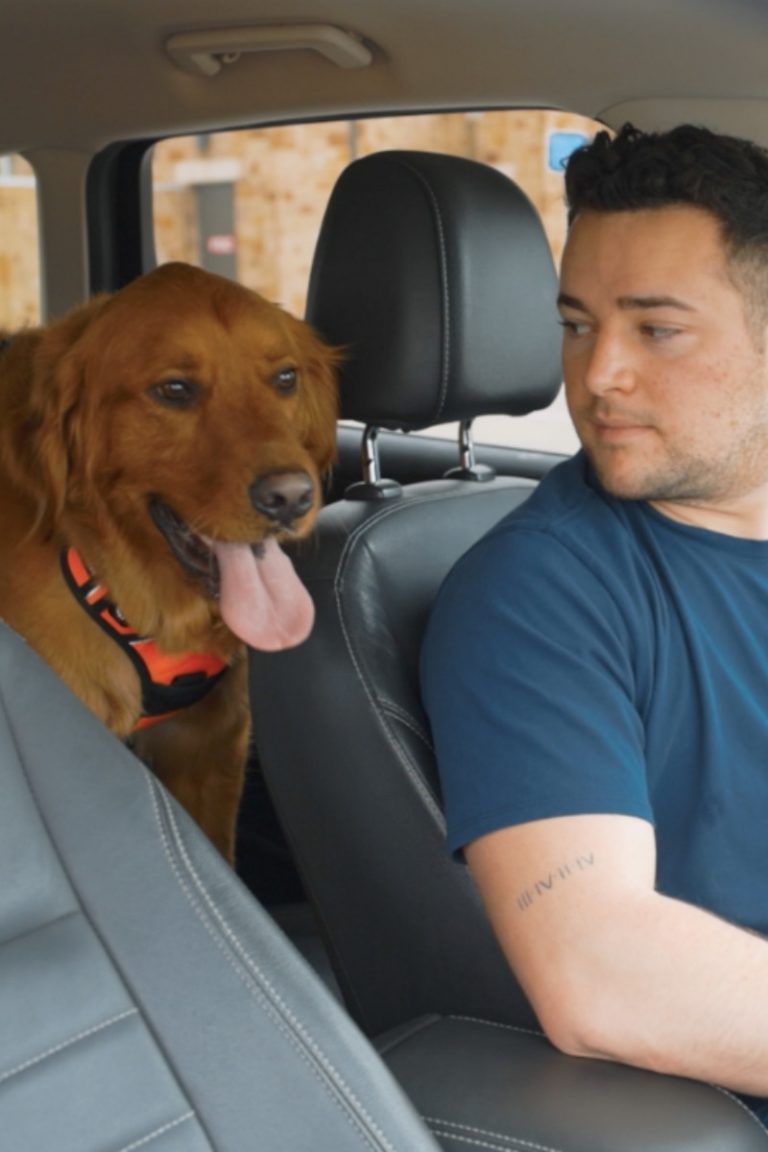
Can Service Dogs Help with PTSD?
- Published on:
- By: ASP Team
Life is full of ups and downs. There are times of joy, times of sadness, times of plenty, and times of need. We all face the usual challenges of everyday life, but many also face difficulties that fall outside the norm. There are some mental health disabilities in this category, and one of them is PTSD. You may or may not be familiar with this condition, but it’s more common than we realize. Let’s explore more in order to answer our question, can Service Dogs help with PTSD?
What is PSTD?
Post-traumatic stress disorder (PTSD) is a psychiatric disorder that can occur when people have encountered or witnessed a traumatic event such as a natural disaster, serious accident, war/combat, domestic violence, abuse, or severe injury. You may have heard the term PTSD used in conjunction with the armed forces. 20% to 30% of U.S. military veterans indeed deal with it, but PTSD affects a broader demographic than just our soldiers. People of any background and any age can battle this disorder. According to the American Psychiatric Association, PTSD affects approximately 3.5 percent of U.S. adults every year, and an estimated one in 11 people will be diagnosed with PTSD in their lifetime.
Get Your ESA Today
ATTENTION
Due to the new Department of Transportation (DOT) policy, Emotional Support Animals are NO longer allowed to fly in airplane cabins for free. However, Psychiatric Service Dogs are eligible.

How does PTSD affect individuals?
People with PTSD suffer from pervasive, disturbing thoughts and feelings related to their experience. These thoughts and feelings remain present long after the event has ended. Individuals with PTSD continue to relive their trauma through flashbacks or nightmares. These situations usually cause intense emotions of sadness, fear, or anger. It is common to feel detached or distant from others. People with PTSD may avoid situations or people that remind them of the trauma, and they may have strong negative reactions to something as ordinary as a loud noise or an accidental touch.
When do you know PTSD exists?
Recognizing the symptoms of PTSD can be tricky. The signs may be glaringly obvious or more subtle when there is an attempt to hide or suppress them. Have you, or a loved one, noticed any of the following behaviors outlined by the American Psychiatric Association? If so, it is possible that PTSD is the culprit, and medical consultation should be sought.
- Intrusion: Intrusive thoughts such as repeated, involuntary memories; distressing dreams; or flashbacks of the traumatic event.
- Avoidance: Avoiding reminders of the traumatic event may include avoiding people, places, activities, objects, and situations that may trigger distressing memories. People may try to avoid remembering or thinking about the traumatic event. They may resist talking about what happened or how they feel about it.
- Alterations in mental capacity and mood: Inability to remember important aspects of the traumatic event, negative thoughts and feelings leading to continued and distorted beliefs about oneself or others (e.g., “I am bad,” “No one can be trusted”); ongoing fear, horror, anger, guilt or shame; much less interest in activities previously enjoyed; feeling alone; or being unable to experience positive emotions.
- Extreme Reactiveness: Reactive symptoms may include being irritable and having angry outbursts; behaving recklessly or in a self-destructive way; being overly watchful or paranoid; being easily startled, or having problems concentrating or sleeping.
What can be done to help?
If you or a loved one has been given a PTSD diagnosis, there are several options to aid in successful management. The three most common treatments are medication, therapy, and the assistance of a Service Dog! Each individual’s biology is unique, so different remedies work for different folks. In the case of prescription intervention, it can often be challenging to find the proper medication and the most effective dosage. Talk Therapy can provide a great source of relief for those who are comfortable opening up to a counselor. Cognitive Behavioral Therapy has also shown promise for those willing to put in the efforts. However, according to a recent research study, treatment dropout rates are often high among military veterans, and many individuals will retain their PTSD diagnosis despite implementing these psychiatric treatments. Given these details, growing interest has been placed in the use of Psychiatric Service Dogs as a supplemental or alternative course of action!

Really? A dog?
Yes, absolutely! According to Rick Yount, a clinical social worker, PTSD patients with Service Dogs can better control their stress levels, remember to take their medications more regularly, and have substantially improved sleep compared to those who do not have one. Psychiatric Service Dogs can be trained to perform a number of specific tasks which alleviate different PTSD symptoms. You can read about these tasks in more depth here.

They can detect physical signs of anxiety and distress, alert their owner to oncoming panic attacks during the day, and interrupt nightmares during the night. PTSD Service Dogs can also be trained to guard their owners (in an unthreatening way) to provide a sense of security in public. Social situations can be very triggering for people living with PTSD, so relying on a companion to calm those nervous energies and provide positive distraction can give back a sense of independence and freedom. Technicalities aside, the pure love and non-judgmental emotional support of a PTSD Service Dog can make all the difference in the world to a hurting individual. While there are no guarantees and no easy recovery from PTSD, Service Dogs can go a long way toward easing the pain and isolation of surviving this disorder.
Not all dogs are suited for a life of service, so it is important to gauge an individual animal’s temperament and abilities. If you are considering seeking out a dog to train as a Psychiatric Service Dog, you may find this post on the best breeds for the job helpful. According to the ADA and the Department of Transportation guidelines, owners are permitted to self-train their service animals. You do not need to pay for professional training services, though you can if that’s preferable or necessary for your situation.
It can take years to navigate from trauma to diagnosis to treatment to living your best life.
Though reaching out to understanding friends and family is crucial, there are innumerable benefits that assistance dogs alone can provide to those with PTSD. Sadly, mental health stigmas are real and irresponsible judgments from the uninformed population often deter those who suffer from asking for help. Service Dogs can make that progression a bit easier. American Service Pets is committed to continuing the conversation and reaching those in need. If you are inspired to seek a support dog or to train your animal for this purpose, we are here for you.

The benefits of an Emotional Support Animal certification and a Psychiatric Service Dog certification are drastically different. Fortunately for you, American Service Pets’ network of active board certified doctor or other licensed mental health providers can help you find the right path to certification. To find out whether you need an ESA or PSD letter, take our easy, three-step Pet Owner Survey!
More Great Resources




